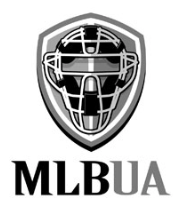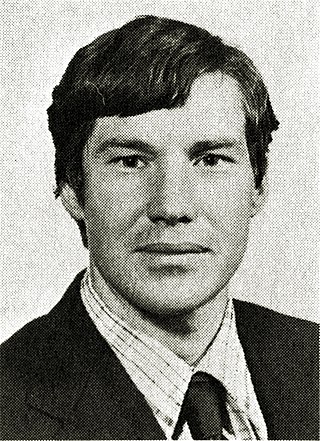Related Research Articles
Xavier Hospital was a hospital located in Dubuque, Iowa. It was located in the northern part of the city at the intersection of Windsor Avenue and Davis Street. With Finley Hospital and Mercy Hospital Xavier Hospital was one of three hospital facilities in the city of Dubuque.

The Major League Baseball Umpires Association (MLBUA) is an organization of Major League Baseball (MLB) umpires. It was certified by the National Labor Relations Board on February 24, 2000, as the World Umpires Association (WUA) as a bargaining agent. It took over as the bargaining agent for MLB umpires after the 2000 MLB season, replacing the Major League Umpires Association (MLUA), which dated back to 1970, and has since been responsible for defending their personal since. On July 17, 2018, it rebranded itself as the Major League Baseball Umpires Association.
The Ottawa Trojans were a Canadian football team based in Ottawa, Ontario and competed in the Ontario Rugby Football Union from 1943 to 1947. After winning the 1947 ORFU championship, the team would merge with the Ottawa Rough Riders in 1948.
The Toronto Indians were a football team from Toronto, Ontario and a member of the Ontario Rugby Football Union, a league that preceded the Canadian Football League. After the Toronto Balmy Beach Beachers moved to the Interprovincial Rugby Football Union in 1941, the Indians began play in the ORFU to fill the void. Ironically, these two teams would merge in 1948 and would continue to be known as the Beachers after that season.

Clark S. Gruening is an attorney and Democratic Party politician from the U.S. state of Alaska. He is chiefly known as the second of three persons to defeat the incumbent holder of Alaska's Class 3 United States Senate seat in the primary election.
Pet Bully (1948–1971) was an American Thoroughbred racehorse who was the first top quality horse that U.S. Racing Hall of Fame jockey Bill Hartack ever rode and who won the inaugural running of the prestigious Woodward Stakes.
Douglas S. Wright was an American attorney and politician who was the mayor of Topeka, Kansas and a candidate for the United States Congress. Wright, who served as Mayor of Topeka from 1983 to 1989, was the son of another former Topeka mayor, Chuck Wright, who led the city from 1965 to 1969.
The Major League Umpires Association (MLUA) was a union for the umpires of both the American League and the National League. It was formed in 1970. It was decertified and replaced by the World Umpires Association, which became the bargaining agent for MLB umpires before the 2000 season.
His Majesty was an American Thoroughbred racehorse and top sire.
William Woodruff Dancy is an American baseball manager and coach. He was third base coach for the Philadelphia Phillies during the 2005 and 2006 seasons. Currently, Dancy is the Minor League Field Coordinator for the Detroit Tigers.
The 1999 Major League Umpires Association mass resignation was a labor tactic used by 68 Major League Baseball (MLB) umpires, including 66 members of the Major League Umpires Association (MLUA), the official umpires union at the time. Unable to strike because they had a labor agreement in place at the time, 57 umpires formally resigned by orchestrated letters in an attempt to force negotiations with MLB for a new labor agreement. The American and National Leagues instead immediately hired new umpires and accepted 22 of the resignations. The union membership became fractured on the issue, and the umpires tried to rescind their resignations, but the MLUA was unsuccessful in retaining the jobs of the 22 umpires and the resignations were seen as final. The incident led to the decertification of the MLUA and the formation of a new union, the World Umpires Association (WUA), now the Major League Baseball Umpires Association.
Benny Marinelli was an American Thoroughbred horse racing jockey best known for winning the Classic Preakness Stakes in 1923.

The 'Springfels' mango is a large, commercially grown mango cultivar that originated in south Florida.
Bardstown (1952–1972) was an American Thoroughbred racehorse.
John Richard Shulock is a former professional baseball umpire who worked in the American League from 1979 to 1999 and throughout Major League Baseball between 2000 and 2002. Shulock wore number 29 when the AL adopted them for its umpires in 1980, and retained the number when the NL and AL umpire staffs merged in 2000. Shulock umpired 3,050 major league games in his 24-year career. He umpired in two World Series, two All-Star Games, four American League Championship Series, and two American League Division Series.
Eugene "Ted" Hendry is a former professional baseball umpire who worked in the American League from 1977 to 1999, wearing uniform number 35 when the AL adopted numbers for its umpires in 1980. Hendry umpired 2,906 major league games in his 23-year career. He umpired in the 1990 World Series, two All-Star Games, four American League Championship Series, and the 1996 American League Division Series. Hendry was also the home plate umpire of Bret Saberhagen's no hitter in 1991 and Jim Abbott's no hitter in 1993.

Rose Woods is a Gettysburg Battlefield forested area that is an American Civil War site of the battle's Hood's Assault, McLaws' Assault, and McCandless' Advance. "Scene of the first line of Union defenses" on the Battle of Gettysburg, Second Day; the 1st Texas Infantry and 3rd Arkansas Infantry Regiments attacked Ward's 2nd Brigade line in the woods. The last combat on the Battle of Gettysburg, Third Day, was "in the early evening. Colonel William McCandless's brigade of Pennsylvania Reserves advanced across the Wheatfield into Rose's Woods where they managed to inflict heavy losses on the 15th Georgia" which had failed to retreat to Warfield Ridge after Longstreet's Assault. Two days later Timothy H. O'Sullivan photographed corpses moved for burial to the edge of Rose Woods and which were subsequently reinterred in cemeteries.
Frederick Charles Spenn is an American former baseball umpire. Spenn was one of the eight minor league replacement umpires who was promoted to the major leagues during the 1979 Major League Umpires Association strike. Spenn wore uniform number 32 when the American League adopted them for its umpires in 1980.
Bruce Irving Rankin, was a Canadian diplomat.
References
- 1 2 Boswell, T. (September 3, 1978). Long-Suffering Umpires Want A Turn at Bat. Washington Post, retrieved June 13, 2016.
- ↑ The Southeast Missourian, "Pryor ready to see strike end" 2 Apr 1979 <https://news.google.com/newspapers?id=F5sfAAAAIBAJ&sjid=NtUEAAAAIBAJ&pg=4172,4187111&dq=umpire+strike+1979&hl=en>
- ↑ Schenectady Gazette, "Court can't force umpires to return to work" 27 Mar 1979 <https://news.google.com/newspapers?id=86ctAAAAIBAJ&sjid=aXIFAAAAIBAJ&pg=5937,8230862&dq=umpire+strike+1979&hl=en>
- ↑ Pittsburgh Post-Gazette, "Umps order Pryor back to work" 9 Apr 1979 https://news.google.com/newspapers?id=ss1RAAAAIBAJ&sjid=W20DAAAAIBAJ&pg=5375,1298231&dq=umpire+strike+1979&hl=en
- ↑ The Day, "Brewers beat Red Sox" 18 Apr 1979 https://news.google.com/newspapers?id=qCIoAAAAIBAJ&sjid=tXIFAAAAIBAJ&pg=3490,3088848&dq=umpire+strike+1979&hl=en
- ↑ Pittsburgh Post-Gazette, "Ump Integrity in Danger" 15 May 1979 https://news.google.com/newspapers?nid=gL9scSG3K_gC&dat=19790515&printsec=frontpage&hl=en
- ↑ The Spokesman-Review, "Umpires won major victory in strike-even fans' approval" 26 May 1979 <https://news.google.com/newspapers?id=bfsnAAAAIBAJ&sjid=IO4DAAAAIBAJ&pg=1673,5736860&dq=umpire+strike+1979&hl=en>
- ↑ Reading Eagle, "Feeney Denies Allegation" 12 Sep 1980 https://news.google.com/newspapers?id=n94hAAAAIBAJ&sjid=LqIFAAAAIBAJ&pg=4037,781211&dq=umpire+strike+1979&hl=en
- ↑ "ODD MAN OUT ON THE DIAMOND - Veteran umpires have made life unhappy for the rookies who crossed the picket lines last spring and then went to work". Sports Illustrated. Retrieved April 1, 2022.
- ↑ The Tuscaloosa News, "Major Leagues send umpire Fields packing" 14 Feb 1982 https://news.google.com/newspapers?nid=1817&dat=19820214&id=kCUdAAAAIBAJ&sjid=TqUEAAAAIBAJ&pg=4332,2799794
- ↑ The Day, "Pallone and other umpires unlikely to be fired" 05 May 1988 https://news.google.com/newspapers?nid=1915&dat=19880505&id=b_YgAAAAIBAJ&sjid=OHMFAAAAIBAJ&pg=1045,1165541